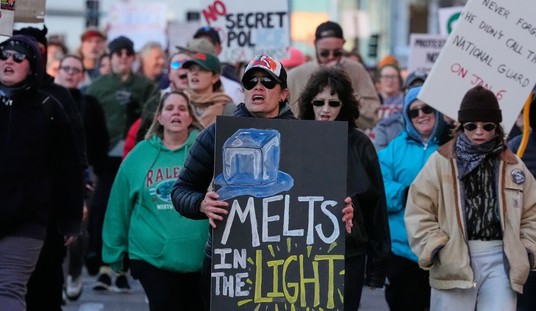Prosecutors will not be allowed to enter evidence that Nidal Hasan intended to commit jihad in his mass murder spree at Fort Hood nearly four years ago, the judge in the court-martial ruled yesterday. Col. Tara Osborn also struck from evidence the correspondence between Hasan and al-Qaeda leader Anwar al-Awlaki, although she did allow prosecutors to use records of Hasan’s Internet usage and search histories at the time of the shooting:
Lawyers representing the family members of those killed and injured in the Ft. Hood shooting rampage were outraged today when an Army judge limited prosecutors from introducing evidence, including emails to a known Al Qaeda operative, that would establish accused shooter Maj. Nidal Hasan’s “jihadi” motives. …
Prosecutors have sought to portray Hasan as a Muslim extremist, motivated by Islamist ideology and in touch with known al Qaeda member Anwar Alwaki.
“He didn’t want to deploy and he came to believe he had a jihad duty to murder soldiers,” lead prosecutor Col. Steve Henricks said in his opening statements. He wanted to “kill as many soldiers as he could.”
The judge, Col. Tara Osborn, ruled today that prosecutors could not mention Hasan’s correspondence with Alwaki, an American born al Qaeda recruiter and organizer. Osborn also barred prosecutors from mentioning Hassan’s interest in seeking conscientious objector status and drawing parallels to a 2003 incident in which another Muslim American soldier attacked U.S. troops in Kuwait, according to the Associated Press.
The judge found much of that evidence was too old, but permitted prosecutors to introduce evidence about Hasan’s internet usage and search history from the time of the attack.
This won’t hamper prosecutors at all, since Hasan admitted to the murders in his opening statement. The charges do not include terrorism, thanks to its lack of inclusion in the UCMJ, but the murder charges carry the death penalty anyway.
The real damage in this ruling is to the survivors and the families of the deceased. They want to pursue civil litigation against Hasan, and against the Obama administration’s designation of the attack as “workplace violence.” Lawsuits will force the Department of Defense to answer for that decision, which keeps the dead and wounded from being recognized as victims of a terrorist attack. An attorney representing the families expressed his outrage yesterday, saying that the evidence of Hasan’s motives should have been allowed as they would in any first-degree murder trial.
Perhaps they may get their wish anyway. Hasan will shortly open his defense, and while most predict he won’t do much during the trial phase, he may be saving it for the sentencing hearing:
In a rare move, Hasan began this week by challenging the government’s definition of “jihad” and — for the first time since the day that testimony began — questioned a witness. …
Hasan briefly cross-examined Staff Sgt. Juan Alvarado, who saw a gunfight between Hasan and Kimberly Munley, one of the Fort Hood police officers who responded to the shootings. Alvarado said Hasan tried to shoot Munley after she had been shot and disarmed.
“Are you saying — and I don’t want to put words in your mouth — are you saying that after it was clear that she was disarmed, I continued to fire at her?” Hasan asked.
Alvarado said that was correct.
If the impression one gets is that this wasn’t a particularly helpful cross-examination for the defense, one would be correct — but only if one assumes that the defense wants to beat the rap. Hasan wants to turn the court-martial into a platform for his jihad, and the most likely place for that to occur will be after the formal end of the defense at the closing, when Hasan can offer lengthy argument, or during sentencing. The survivors and families of the deceased will likely get a trove of on-the-record statements from Hasan that will more than suffice for their lawsuits.








Join the conversation as a VIP Member